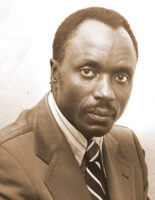
As a newcomer to politics, Kirugi Joseph Laiboni M’Mukindia took many by surprise following his dramatic victory in the 1988 General Election. Even in his home district of Meru, he was not known. He defeated two veteran politicians — Julius Muthamia and Jenaro Gituma — in the parliamentary race for Meru South-West Constituency (later renamed Central Imenti). Since independence, Muthamia and Gituma had been the main competitors for the seat before M’Mukindia arrived on the scene.
M’Mukindia was described by many as shrewd, quick-witted and self-driven. He was well-educated, young and energetic when he joined politics and during his campaign, he managed to create strong grassroots networks.
He had worked in senior positions at different multinational corporations and had prepared enough resources to fund his campaign, making him a formidable candidate. He also had a very appealing message: given the chance to become the people’s representative, he would be in a position to pull substantial resources from the centre of power to develop the constituency since he had strong government connections.
M’Mukindia worked in different ministries as a Cabinet minister under President Daniel arap Moi. After winning in 1988 he was appointed Assistant Minister for Energy.
A chemical engineer by profession, he had worked with different oil companies. His last assignment before he ventured into politics was as a planning and supply manager at Kobil Petroleum Limited, formerly known as Mobil Oil Company.
M’Mukindia had previously worked with the Kenya Petroleum Refineries Limited, having joined the government-owned company in 1974 after graduating from the University of Surrey in the United Kingdom. He left the corporation in 1979 to work with Kobil, a multinational corporation.
M’Mukindia and Mathews Adams Karauri (Tigania Constituency) supported the ruling party, KANU, and President Moi at a time when other Meru politicians were agitating for the country to return to a multiparty system.
His loyalty to KANU and the President was unquestionable. He had defended the party and the government through a series of press statements. He also teamed up with Karauri, who was the Assistant Minister for Education, to challenge the long-standing leadership of Jackson Harvester Angaine. Karauri was equally well-educated and had been elected Vice Chairman of KANU Meru branch.
In December 1991, the KANU government re-introduced pluralism. This changed Kenya’s political landscape as several political parties were registered.
In the Mt Kenya region, Mwai Kibaki formed the Democratic Party and Kenneth Matiba — one of the leaders who had been detained for agitating for multipartism — formed the Forum for the Restoration of Democracy (FORD)-Asili. KANU reacted by restructuring its presence in Meru.
Moi appointed M’Mukindia Minister for Research, Science and Technology to replace George Muhoho, who had left KANU to join DP. M’Mukindia faced the 1992 General Election in an area that supported the Opposition.
Once again, just like in 1988, he defied the odds in Imenti Central by comfortably retaining the seat on a KANU ticket against three Opposition candidates. Moi reappointed him to the Cabinet, this time in the Ministry of Commerce and Industry.
M’Mukindia was among the most articulate ministers in Parliament, ably answering every question raised by the Opposition. The minister also made bold decisions. In the early 1990s, he stripped the Kenya National Chamber of Commerce and Industry of its mandate to issue ordinary certificates of origin to local exporters. This prompted protests from several entrepreneurs.
He took the decision after it was found that some foreign and local entrepreneurs were exporting non-Kenyan products to other markets using fraudulent local certificates of origin. The entrepreneurs were purporting that the products being exported were manufactured in Kenya.
On 2 March 1994, the Daily Nation quoted M’Mukindia as saying: “This has been done by misrepresenting these products as being Kenyan products through fraudulent use of a Kenyan certificate of origin.”
The minister explained that if the malpractice continued, it could frustrate Kenya’s efforts to promote its exports, especially in countries that applied quota systems on imports. Such countries, the minister argued, could put restrictions on genuine Kenyan exports. He therefore directed that the role of issuing such certificates be reverted to the ministry.
M’Mukindia also featured prominently when Kenya implemented structural adjustment programmes.
Once again, just like in 1988, M’Mukindia defied the odds in Imenti Central. He comfortably retained the seat on a KANU ticket against three opposition candidates.
He consistently performed well as a minister and was considered one of the most brilliant minds in the Cabinet. However, his strong defence of the ruling party and the government earned him criticism from peers in Parliament and from the Press.
Despite attempts to oust him from the position of Meru KANU branch Vice Chairman, and other issues that arose from his being a KANU leader in an Opposition zone, M’Mukindia was one of the leading government agents in Meru County. Every development project, including the expansion of health facilities, improvement of the road network and creating new administrative divisions to bring services closer to the people, was associated with him.
In 1997, M’Mukindia was transferred to the Ministry of Energy just before the General Election held in December. He lost the seat to Gitobu Imanyara and won it back in 2001 as a National Rainbow Coalition (NARC) candidate, only to lose it to Imanyara again in 2007. He contested the seat again in 2017 but lost.
To many, M’Mukindia remains a gallant politician who spoke his mind and had all the answers at his fingertips for every criticism made against him.
